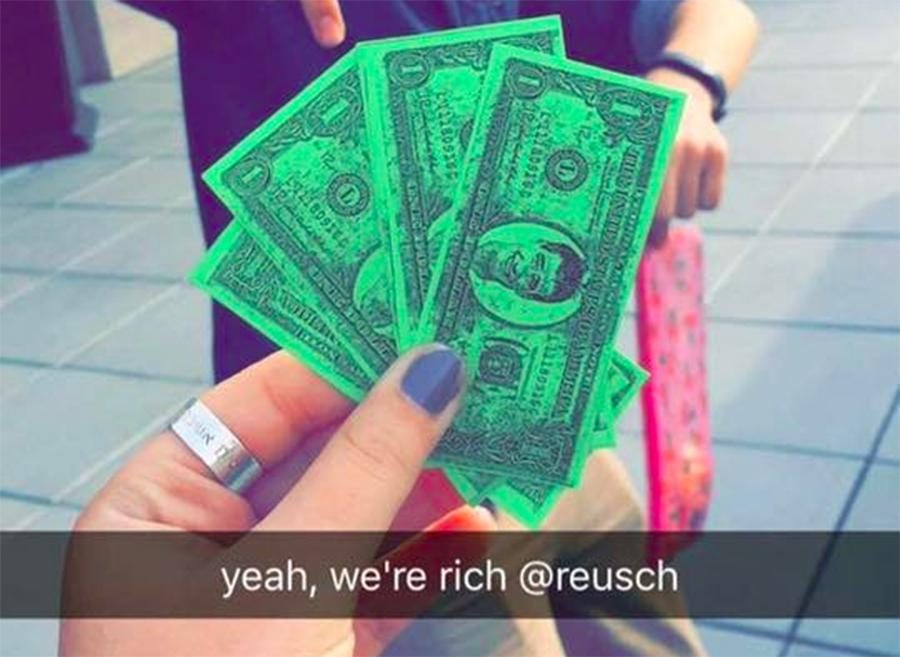Taxes, loans, money-laundering…in class?
Photo Courtesy: Sarit Ashkenazi
UNEVEN: Junior Sarit Ashkenazi admires her Reuschbucks on Snapchat last month. Students worked toward the same goal, but some started with only a few dollars while others were given many.
February 10, 2016
If you happen to spot paper bills on the floor with the head of History teacher Mr. William Reusch on them, pick them up. They may not be very useful at a Starbucks or clothing store, but “Reuschbucks” are pretty valuable to certain students in Mr. Reusch’s classes.
Once again this year, Mr. Reusch has created a mini-economy in upperclass Government and Economics through a system of fake money called Reuschbucks. This time, interest rates, taxes, bankers, investments and loans are all components, and the exercise will last all year and account for 10 percent of students’ final grade.
Mr. Reusch introduced the idea of creating a marketplace last year. Groups of students competed against each other to see who could sell the most candy bars and thus profit the most in Reuschbucks. Although this activity remains, the game has become much more complex.
“Because the second semester with seniors is challenging with the Poland-Israel trip, Economics got cut out (last year),” Mr. Reusch said in an interview. “I figured this was a way I could go into more depth in government, and then still cover economics throughout the year.”
This year, students can invest in a higher education for themselves, real estate or a startup company. Investments are pretty risky, because how much money one makes is determined by a number rolled on dice. Real estate investments have the highest probability of profit, but startup investments have higher reward potential.
At the end of each month, students pay three percent of their Reuschbucks as a tax, but then receive a five percent interest rate on any money not tied up in investments.
How well students do on tests, quizzes, and activities also affect how many Reuschbucks they make. But at least in the first few months of the year, what distinguished the wealthy and poor was the amount of money received on the first day of the game.
One student was given $5,000 while others began with just $1, since in the real world people are born into different financial situations.
Senior Jonah Gill in Mr. Reusch’s honors class appreciates this non-traditional teaching method.
“It’s an intuitive way to learn it,” Jonah said. “We’re not traditionally learning all these concepts, but when you have the Reuschbucks, you end up learning these things. We still have normal Econ classes, where he has Powerpoints, but for some concepts, it’s cool to learn them this way.”
Students are also learning about something that was unexpected in the original lesson plan: the causes of cheating.
At the beginning of this year, students who were randomly assigned less money than others were tempted to cheat.
“Even moral kids, the first thing they were like ‘Ooh, how are we going to steal from the rich kid,’ or ‘how can we lie about this,’ or ‘how can we find a shortcut,'” said Mr. Reusch. “Because it’s so hard to make money the legitimate way.”
Students were as surprised as Mr. Reusch was.
“I was a little upset at first, but I realized this is how the real world works,” senior Kian Marghzar said when he found out he was poor. “Not everyone is born into a rich family, and the best way to elevate yourself and become successful is to do hard work . . . The most successful person works the hardest.”
Kian learned, he said, that a rich man has a head start on a poor man, but with enough hard work, the poor man may eventually surpass him.
In the Reuschbucks system, this hard work would be studying for tests and quizzes, because the higher the grade a student gets, the more Reuschbucks they receive.
“He’s motivating us through the Reuschbucks to work harder, and teach us how hard work will eventually give you success,” Kian said. “That’s what the American dream really is.”
But hard work isn’t always the most attractive route. Last year, some students in Reusch’s class cheated by printing Reuschbucks, or selling them for actual money.
“I think that’s really interesting, because that’s what it’s like to be poor in America . . . to go from being poor . . . to being middle class or wealthy, it’s really really hard, but if you cheat, it’s easier,” Mr. Reusch said.
This year, other cheating tactics arose.
Since at the start of every month students receive five percent interest on the amount of Reuscbucks they have, in the beginning of the year some decided to take loans from richer students in order to increase the amount of interest they earned.
Since there weren’t any rules against cheating at the time, there weren’t any penalties.
After the activity, Mr. Reusch found out about the cheating, so he asked the students who did cheat to come clean, so the class could analyze why they did.
This year, Mr. Reusch has enforced consequences such as large fines for cheating. So far this year, no one has been caught cheating.
Kian said he restrained himself from cheating, because it isn’t ethical.
“I was thinking about stealing, but I realized (it’s) probably not the best idea moral-wise,” said Kian.
No government system is perfect, including Reuschbucks. Just like a real national economy, Mr. Reusch — and Dean of Students Mr. Jason Feld, who contributed to this idea — are constantly tweaking and improving their system.














